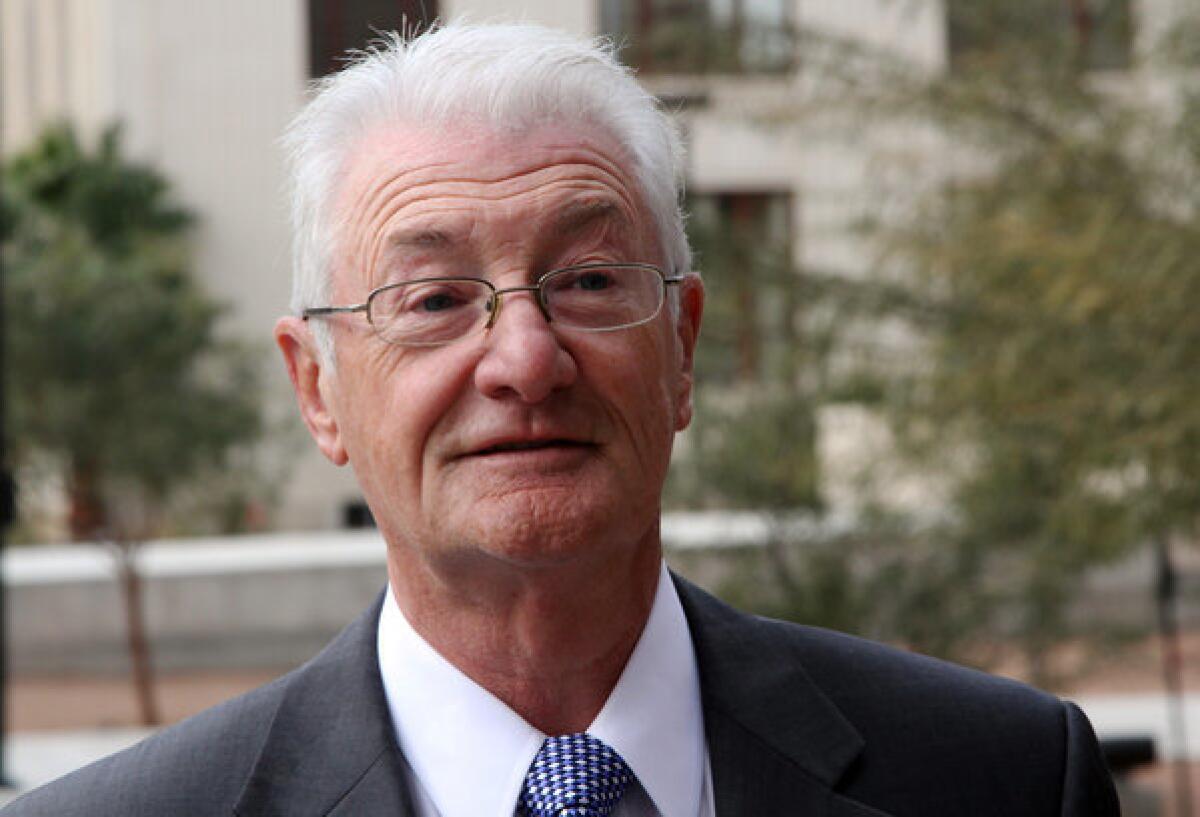Briton who tried to sell arms parts to Iran sentenced in Texas

- Share via
HOUSTON -- A retired British businessman who had fought extradition from England for two years was sentenced Wednesday to 33 months in federal prison for trying to sell missile batteries to Iran.
Christopher Tappin, 65, turned himself in last year and initially pleaded not guilty to the federal charges after a long fight against extradition. In November, Tappin -- whose family still lives in the London suburb of Orpington -- pleaded guilty to trying to buy batteries for Hawk missiles from an undercover U.S. agent for export to Iran.
The agent was based in El Paso, and Tappi appeared in federal court in that city Wednesday.
In addition to imposing the prison term, U.S. District Judge David Briones on Wednesday fined Tappin $11,357.14, the amount Tappin had profited from the illegal scheme, and placed him under three years’ supervised release after his prison term.
“We’re glad that the judge accepted the terms of the plea. Judge Briones did everything we asked that he do,” said Tappin’s attorney, Houston-based lawyer Dan Cogdell.
Cogdell told the Los Angeles Times that the judge also agreed to grant Tappin’s repatriation agreement, which provides that “he be returned to the U.K. as soon as possible,” probably after serving four to six months at a federal prison in Allenwood, Pa., where he is expected within 60 days.
Once Tappin returns to Britain, he will probably be eligible for unsupervised release almost immediately, and plans to return home to help his sick wife, who recently had surgery, Cogdell said.
He said Tappin served about two months in Otero County Prison across the state line in New Mexico after he was extradited, then was released on bail and went to live with Cogdell’s family in Houston before moving to an apartment in town.
Federal prosecutors claimed victory in the case, which sparked a debate in Britain about whether British and American citizens are treated equally under the countries’ extradition treaty.
“Mr. Tappin admitted that he submitted false shipping documentation to circumvent U.S. export control regulations. Those who violate federal law for monetary gain, and in the process put the national security of the United States and its allies at risk, will face prosecution and punishment for their callous disregard for the public’s safety,” Robert Pitman, U.S. attorney in West Texas, said in a statement Wednesday.
Tappin pleaded guilty to one count of aiding and abetting the illegal export of defense articles, admitting that from December 2005 to January 2007, he coordinated an illegal attempt to export zinc-silver oxide reserve batteries to Iran. Such batteries require a license or written authorization from the U.S. State Department for export from the United States.
An El Paso grand jury had already indicted Tappin in 2007 on suspicion of scheming to export the batteries to Britain without a license, aiding and abetting the illegal export of defense articles and conspiring to conduct illegal financial transactions.
Tappin is accused of purchasing the batteries in 2006 as part of a sting involving an undercover federal agent. According to prosecutors, the British businessman wired about $25,000 from London to a U.S. bank as payment, using false shipping documentation to arrange for the transfer of the batteries without an export license through freight forwarders in violation of export control regulations.
ALSO:
Staten Island panel recommends armed officers in schools
Prosecutors: James Holmes ‘didn’t care who he killed or how many’
Alabama police: High school white supremacist planned bomb attack
More to Read
Sign up for Essential California
The most important California stories and recommendations in your inbox every morning.
You may occasionally receive promotional content from the Los Angeles Times.









